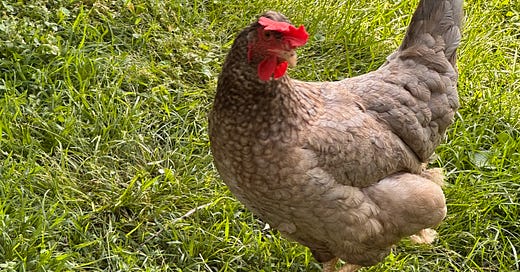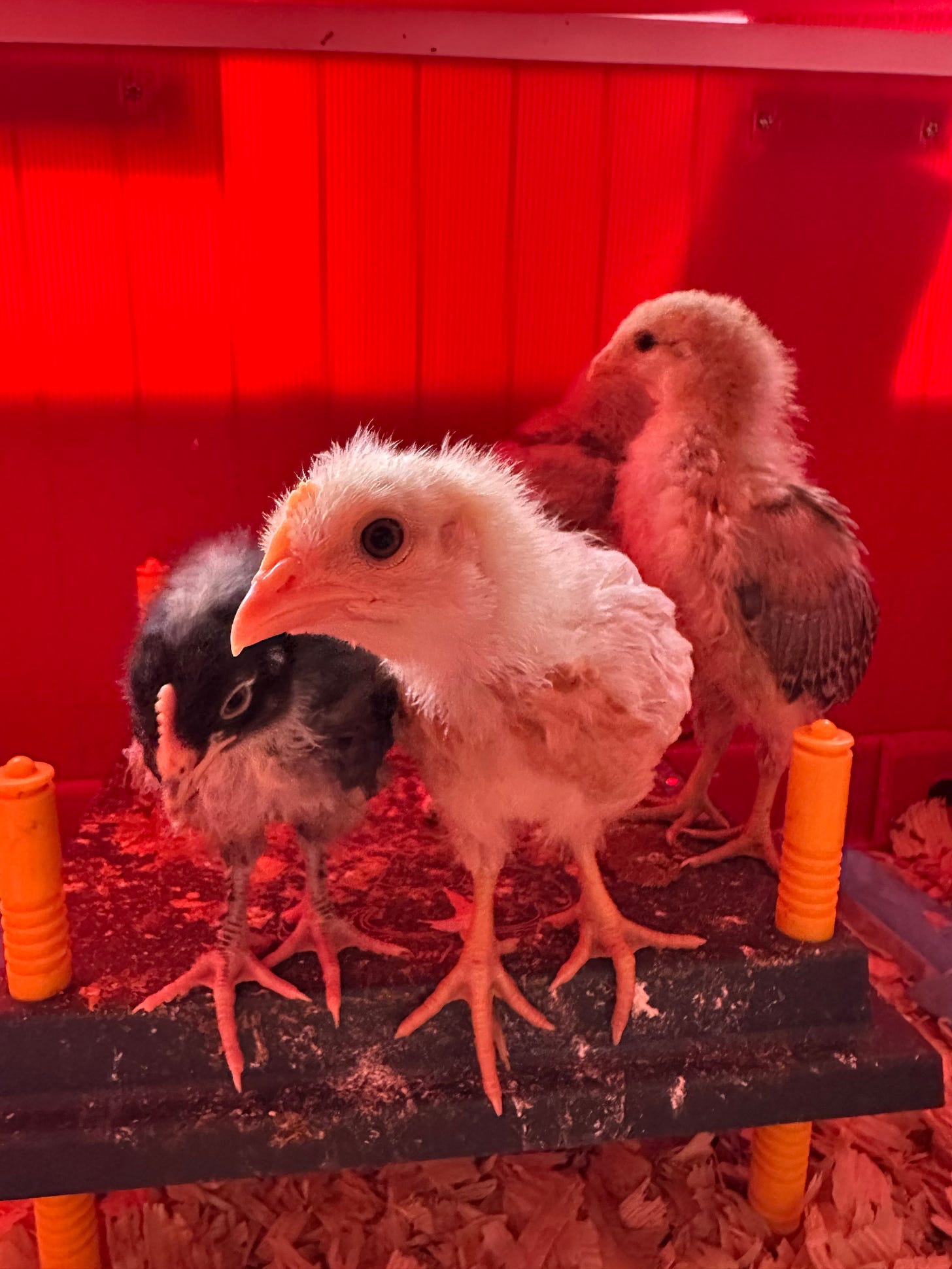Two weeks ago, I picked up Gilly the chicken to find that she had a gnarly injury to her back leg and while we did everything we could, the reality of any size farm is that life is fragile and death obeys no man (or woman).
Chickens aren’t exactly the brightest creatures, and while I signed up for eventually stewarding through to, well, stew, I thought we’d have plenty of time before I had to do that. But in the short time I’ve had livestock, the reality of caring for animals that aren’t pets — no matter how much we love them — has hit home in short order.
Gilly, named Gilda, after Radner, for her wild "feather toupee” and floppy comb, had a death wish from the beginning. Last summer, just a few months after we adopted her out of a backyard chicken operation that didn’t seem entirely legal, she contracted some sort of weird respiratory illness and stopped laying her sweet green eggs. Now, I can treat chickens — having backyard poultry requires an on-the-job degree in chicken first-aid, including diagnosis and treatment of most illnesses, parasites, and worms (I can now administer Ivermectin with the best of them) — but the prospect of bird flu wiping out my little hand-raised flock terrified me enough to spend money and time on a farm vet an hour away.
Gilly was diagnosed with an upper respiratory infection and put on antibiotics, which necessitated that she be separated from the rest of the flock, and if the cold didn’t nearly kill her, the loneliness almost certainly did. I couldn’t stand to see her so sad, and dropped her back in the coop before she was ready, but she was already flopping on her side, giving up on life. I didn’t think she’d make it through the night.
But she did.
Then in the summer, apparently tired of the companionship that saved her, she abandoned her flock at night to climb a 10-foot wire fence and roost overlooking the neighbor’s yard, then promptly forget she had wings and could fly back down. At one point, our erstwhile lead hen, Kevin, must have gone looking for her and failed to convince her to return to ground level; Kevin eventually started spending her nights out roosting with Gilly to protect her while the rest of the flock stayed safe in the coop.
When Kevin was found dead a few days later, we suspected it might have been a heart attack from all of the stress Gilly had put her through.
Eventually, I just put a step ladder out and waited at my laundry room window until Gilly went up for the night, and then combination grabbed-pulled her down from her roost and forced her into the coop. We did this dance for weeks until she gave up. She never realized she could fly.
Then, this happened. We don’t know exactly how she tore her backside up, but knowing her IQ, it was most likely self-inflicted, probably trying to get through a hole in the same fence she couldn’t get down from. It’s also possible she flew up and tried, finally, to solve her own problem. But either way, it was a mess. And probably days before I found out what was wrong, since even I don’t typically pick up chickens.
Once we found the wound, we did our best to treat it and keep it clean, but it was probably just too late. An infection on anyone’s rear end is bad news, and its especially bad news when you’re frequently hanging out in your own poop (I told you they aren’t especially smart). She stopped laying last week and, last night, she passed quietly, right around dusk, surrounded by her sisters.
Death is a big part of farming — even mini-farming. Just because the farm is in my backyard and my flock is just 6 instead of 600 doesn’t mean we’re not facing some hard stuff head on. Kevin passed unexpected last year, and that was our first brush with death — and it hit me hard, not just because she was my constant companion and favorite hen, but because I’d raised her since she was a day old. She grew up alongside the project, and it was a parting we weren’t ready for.
There were more partings, too. Pikachu was killed by a neighborhood dog. Unnamed chicks died before hatching. One particularly sickly chick failed to thrive and had to be culled — the first time I ended a life with my own hands, even though I’d sat with plenty of pets in their last moments, after I’d made the decision to let them go. It was what I owed them. A good death.
Before we started the project, I’d had a few brushes with death. My own. Close family. Beloved friends. The “grace of a good death” was starting to have certain meaning to me, as I thought about what it meant for me to have a good death in addition to a good life.
Now I hold lives in my hands. And I’m reckoning again with what it means to give them a good death in addition to a good life.
In a way, my silly little backyard farm has taught me more about death than even coming close to my own — life is precious, and its fleeting. And death waits for no man. When it’s coming, it’s coming, and you’d better be ready. Farmers, even small-bore farmers, collaborate with our own Creator in bringing life forth from soil and seeds and eggs and embryos, and we usher it out, too, back into His hands. The plants, the animals, the earth — we owe them all good lives…and good deaths.
I previously only got this kind of intimate collaboration in creation when I made my own children. That was mystical. This is mystical, as much as it is hard and dirty and frustrating and lovely. It’s also this incredible place where life and death and creation and destruction meet. And I get to experience that every single day. And I get to understand, maybe on a very basic level, what was felt when we were all created.
Some days, its just harder than others.
I hope Gilly is happy. I hope her death was good. I know the Catholic Church doesn’t really believe that animals and plants, without eternal souls, make the journey to heaven, but I also know that Heaven is a place of perfect happiness, and if I need my chickens to be perfectly happy, they’ll be there to meet me, and I hope they believe I gave them good lives and good deaths. That they know I cared for them, and respected them. And understood them. And loved them. Each of them.







I'm so sorry and your writing a graceful, lovely tribute to your farm family shows just how much you do care and care enough to give them good lives and good deaths. I lost a baby, we had to say goodbye to one of our three beloved dogs a few weeks ago and have a second with aggressive cancer. We (my husband and our two toddlers) just acquired three 5-day-old chicks who are living in our dining room at the moment, so it's busy. You are an inspiration and a good soul, and you give me hope. Thank you for sharing this part of yourself with us.
I came here by way of Jenna’s sharing your post, so I signed up, too! She’s right: what a sweet tribute. You’re giving me the inkling to write about our chickens on the farm 45 years ago, and the one who got away from the hatchet. For me, when I take in a deep breath of our west wind moistened by chicken droppings, buffalo, cow, and horse manure, wet corn silage, and rain, and I see white butterflies circling crazily over a puddle, I see us in that mad whirlwind of life chasing death chasing life. Great work, Emily!